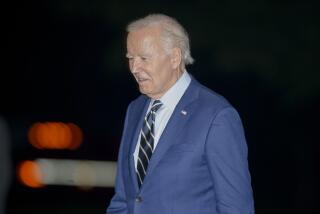Biden: President promises to keep Iran from getting nuclear weapons
WASHINGTON – President Obama is “not bluffing” when he vows that he will not allow Iran to get a nuclear weapon, Vice President Joe Biden said Monday in a speech that put a heavy emphasis on winning consensus on that view from the rest of the world.
Speaking to supporters of Israel, Biden reiterated that “all options, including military force” are on the table as the U.S. works to prevent Iran’s acquisition of nuclear weapons.
“We are not looking for war,” Biden told the American Israel Public Affairs Committee at a policy conference.
It is “critically important for the whole world to know we did everything in our power … to avoid any confrontation,” he said. If it comes to that, he said, “it’s important that the rest of the world is with us.”
Biden didn’t change the stated policy of the United States, or even the administration’s talking points, in his morning remarks.
PHOTOS: President Obama’s past
But his comments come as Obama plans a trip to Israel this month meant to reaffirm his commitment to Israel and, tacitly, to reassure the Israeli people and their leaders in the wake of his own reelection and that of Prime Minister Benjamin Netanyahu.
“I learned it’s never a good idea … to steal the president’s thunder,” the vice president joked, explaining the president would expand on Biden’s remarks during his visit.
In his comments, Biden hit the key policy points his audience wanted to hear, restating U.S. commitment to the Iron Dome defense program and opposition to unilateral efforts by the Palestinian Authority to gain affirmation for statehood status.
He called on the world to treat Hezbollah as a “terrorist organization, period,” condemned efforts to de-legitimize Israel and backed the country’s right to impose a trade blockade.
Obama will be in Israel just before Passover and plans meetings both in Jerusalem and in Ramallah. He is expected to give one major address to the region, roughly four years after he began his outreach to the Muslim world in a trip to Cairo.
Obama is also likely to meet with young Israelis who are eager to hear directly from him in the wake of tense election-year relations between Obama and Netanyahu.
The vice president, who also spoke to the AIPAC conference in 2009 as the administration began its first term, downplayed any apparent tension.
“I’ve been around a long time. I’ve been there for a lot of prime ministers. We’ve always disagreed on tactics,” he said. “But ladies and gentlemen, we have never disagreed on the strategic imperative that Israel must be able to protect its own, must be able to do it on its own, and we must always stand with Israel to be sure that can happen.”
[Updated, 12:17 a.m. March 4: Netanyahu, who addressed the group via satellite after Biden’s address, largely welcomed the vice president’s remarks but made it clear his patience with the administration’s approach seeking a diplomatic solution was wearing thin.
“Diplomacy has not worked. Iran ignores all these offers. It’s running out the clock. It has used negotiations, including the most recent ones, to buy time to press ahead with its nuclear program,” he said. “It’s still not crossed the red line I drew at the United Nations last September, but Iran is getting closer to that red line, and it’s putting itself in a position to cross that line very quickly once it decides to do so. … We must stop -- we have to stop its nuclear enrichment program before it’s too late.”]
Biden also made similar allusions to his long career in public office, and what he described as his personal commitment to Israel and to the powerful political force of AIPAC.
“I did more fundraisers for AIPAC in the ‘70s and early ‘80s than -- just about as many -- as anybody,” he said.
He closed with a story about his first meeting as a senator with then-Prime Minister Golda Meir that affirmed that commitment, which drew a standing ovation from the audience.
“Our job is to make sure … that there’s always an Israel, that there’s always a secure Israel, and there’s an Israel that can care for itself,” he said.
Biden was speaking to an audience wary of the administration’s position on Iran and the Middle East. Sen. John McCain (R-Ariz.) got hearty applause from the group when he criticized the administration for not being sufficiently pro-Israel.
“We need members of the national security team who are pro-Israel, not anti-Israel,” McCain said.
Staff writer Paul Richter contributed to this report
Follow Politics Now on Twitter and Facebook
Twitter: @cparsons
Twitter: @mikememoli
More to Read
Get the L.A. Times Politics newsletter
Deeply reported insights into legislation, politics and policy from Sacramento, Washington and beyond. In your inbox three times per week.
You may occasionally receive promotional content from the Los Angeles Times.












